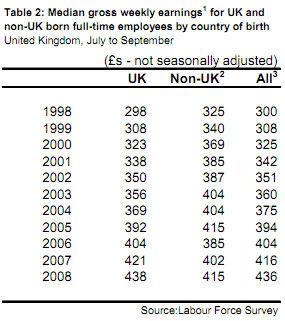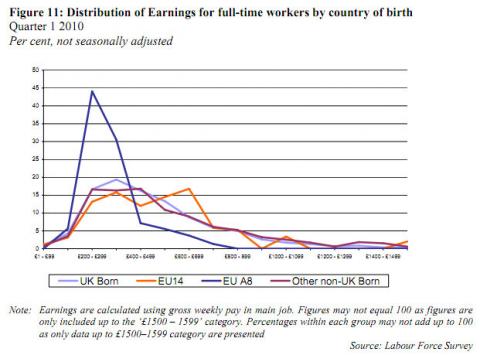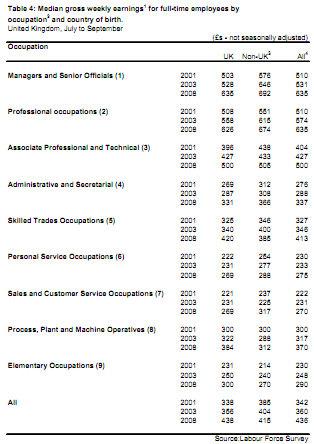Do UK immigrant workers have higher average earnings than UK born workers?
"One of the really surprising things for me about immigration and average earnings, is that actually the earnings on average of people who were not born in this country are higher than the earnings of people who are. So the ideas that this is just people taking poor jobs is simply untrue." Chris Huhne, Question Time, 14th of April.
Whether migrant workers coming to the UK have put downward pressure on wages by taking low paid jobs is a contentious and long-running issue.
The topic was once again raised on Question Time this week. However, Energy and Climate Change Secretary Chris Huhne responded by arguing that average earnings of non-UK born workers are actually higher than their British-born equivalents.
Seeking more detail on this issue, Full Fact looked further into the figures.
The Office for National Statistics produces data on the employment of non-UK born workers as well as on wage earnings. Unfortunately, these two sets of statistics are gathered within different data sources, and are not combinable.
However, the ONS have themselves looked at the issue, producing an article that models the available data to provide an estimate of average earnings of non-UK born workers between 1998 and 2009.
It shows that average earnings of non-UK born workers was higher than UK-born workers between 1998 and 2005, but since then they have have been lower.

The ONS has completed a more recent analysis of non-UK born workers, but only look at income distributions and not average earnings.
The graph below shows this income distribution. The 'EU14' refers to pre-2004 EU members, while the 'EUA8' refers to post 2004 members: the Czech Republic, Estonia, Hungary, Latvia, Lithuania, Poland, Slovakia and Slovenia.

The graph shows that in early 2010, relative to UK born workers, non-UK born workers from the EU14 have a better average income distribution, EUA8 workers have lower average wages and other non-UK born workers have a similar income distribution.
Whether or not overall non-UK born workers have had higher average earnings in 2009/10 is not shown in the data, and Full Fact is still researching the issue.
The ONS report covering 1998 to 2008 also highlights the lower average earnings of EUA8 workers, noting that those coming from the USA had the highest average earnings.
It also stated that: "The earnings for non-UK born people in Managerial and Professional occupations are consistently higher than earnings of their UK born counterparts. Whereas, UK born earnings are higher than non-UK born earnings in Sales, Process, Plant and Machine Operatives and Elementary Occupations."
There earnings breakdown based on occupations is summarised in the following table. This shows that for the professions, non-UK born workers are more likely to have higher average wages than UK born workers; but that for occupations other than the professions this trend reverses.

Conclusions
From the data that is available we cannot confirm overall average earnings of UK born workers with non-UK born workers in 2009 and 2010, although income distribution tables show that workers from the EUA8 do have lower average earnings.
Over the period 1998 to 2008 the figures show that up to 2005 non-UK born worker have had higher average earnings, with UK born workers having higher average earnings since 2005.
While revealing, these figures do not answer the question of whether foreign workers have depressed UK wages; although the average earnings of non-UK born workers in non-professional occupations is lower than for UK born workers.